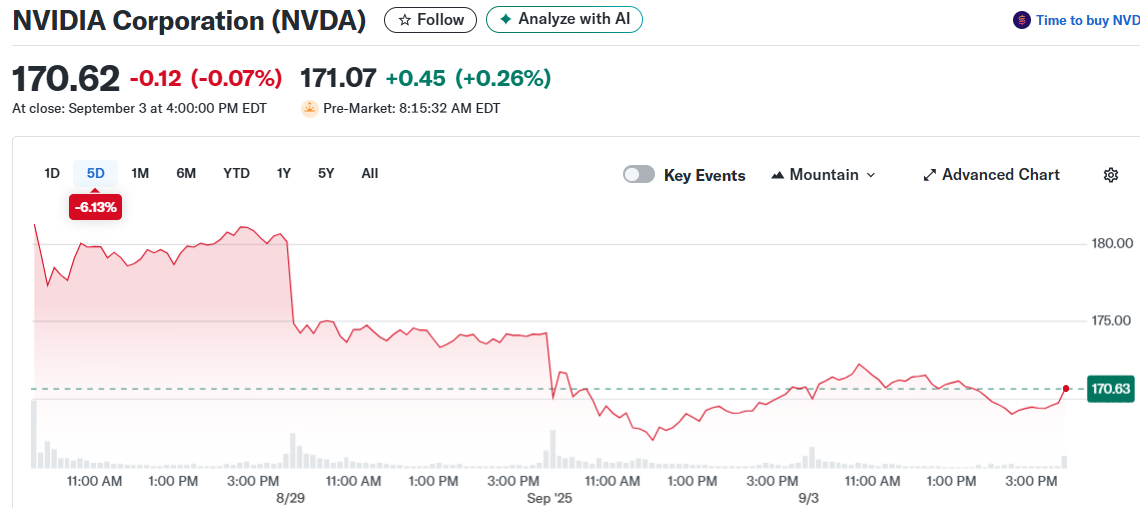TLDR
- Jim Cramer urged investors to focus on GPU profitability for NVIDIA customers rather than China sales noise
- NVIDIA reported Q2 earnings of $1.05 per share and revenue of $46.74 billion, both beating estimates
- Company secured deal to sell H20 AI chips in China but must give 15% of revenue to U.S. government
- Alibaba developed competing AI chip that’s more versatile but still less capable than NVIDIA’s processors
- Stock tested 50-day moving average after three-day decline following earnings release
NVIDIA shares tested critical technical support Wednesday as the AI chipmaker navigates complex China operations. The stock has declined three straight days since releasing second-quarter earnings last week.

Mad Money host Jim Cramer offered key insight before NVIDIA’s earnings release. He told investors to ignore China sales debate and focus on GPU profitability for customers instead.
“He wanted 20, Jensen got it down to 15,” Cramer said, referring to profit margins negotiations. Cramer called the China sales discussion “noise” that distracted from more important fundamentals.
The company delivered solid second-quarter results despite investor concerns. NVIDIA reported earnings of $1.05 per share, beating analyst expectations of $1.01 per share.
Revenue reached $46.74 billion, topping the $46.05 billion consensus estimate. However, the company’s third-quarter revenue forecast of $54 billion only slightly exceeded Wall Street’s $53.43 billion expectation.
China Revenue Deal Raises Legal Questions
NVIDIA secured permission to sell H20 AI chips in China through an unprecedented revenue-sharing agreement. Under this deal, the company must pay 15% of China chip revenue to the U.S. government.
Legal experts questioned the arrangement’s validity. International trade attorney Doug Jacobson called the situation unprecedented, noting potential conflicts with Bureau of Industry and Security regulations.
Former BIS senior adviser Aiysha Hussain suggested the revenue structure could violate existing agency statutes. The arrangement differs from typical export license fees, which aren’t based on earned revenue.
NVIDIA reported zero H20 chip sales from China in the second quarter. The company excluded H20 sales projections from its third-quarter revenue outlook.
Advanced Micro Devices also struck a similar revenue agreement with the Trump administration. Both companies are managing complex trade relationships as U.S.-China tensions persist.
Alibaba Competition and Technical Analysis
Chinese e-commerce giant Alibaba developed a new AI chip for internal operations. The Wall Street Journal reported the chip offers more versatility than previous Alibaba versions but remains less capable than NVIDIA’s advanced processors.
This development represents growing Chinese efforts to reduce foreign chip dependence. The timing coincides with NVIDIA’s ongoing regulatory challenges in China.
NVIDIA had ordered Taiwan Semiconductor to produce 300,000 H20 chips, adding to existing inventory of 600,000-700,000 units. The company sold approximately 1 million H20 chips in 2024.
The stock fell below its 50-day moving average Tuesday and tested that level Wednesday. Technical analysts suggest waiting for proper base formation before considering purchases.
NVIDIA announced a $60 billion share buyback program alongside earnings. The company reached a $4 trillion market capitalization in July, becoming the first to hit this milestone.
Analyst William Blair’s Sebastien Naji maintained an outperform rating with a $205 price target. Susquehanna’s Christopher Rolland raised his target to $210 from $180 while remaining cautious about China revenue.






